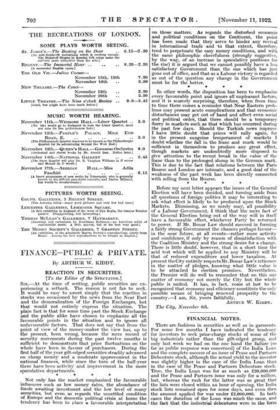FINANCE-PUBLIC & PRIVATE.
By ARTHUR W. KIDDY.
REACTION IN SECURITIES. [To the Editor of the Sere'rxron.1 SIR,—At the time of writing, public securities are ex- periencing a setback. The reason is not far. to seek. It would be easy to assert simply that the reaction in stocks was occasioned by the news from the Near East and the demoralization of the Foreign Exchanges, but that would not entirely express the situation. The plain fact is that for some time past the Stock Exchange and the public alike have chosen to emphasize all the favourable points in the situation and to ignore all unfavourable factors. That does not say that from the point of view of the money-maker the view has, up to the present, been wrong, because the mere record of security movements during the past twelve months is sufficient to demonstrate that price fluctuations on the whole have been in favour of purchasers. During the first half of the year gilt-edged securities steadily advanced on cheap money and a moderate improvement in the national finances, while since the turn of the half-year there have been activity and improvement in the more speculative departments.
Not only has the market emphasized the favourable influences such as low money rates, the abundance of funds awaiting investment and the low level of many securities, but even as regards the unsettled condition of Europe and the domestic political crisis at home the tendency has been to place a favourable interpretation on those matters. As regards the disturbed economic and political conditions on the Continent, the point has been made that they serve to hinder any revival in international trade and to that extent, therefore, tend to perpetuate the easy money conditions, and with the same philosophic cheerfulness (strongly suggestive, by the way, of' an increase in speculative positions for the rise) it is argued that we cannot possibly have a less satisfactory Government than the one which has just gone out of office, and that as a Labour victory is regarded as out of the question any change in the Government must be for the better.
In other words, the disposition has been to emphasize every favourable point and ignore all unpleasant factors, and it is scarcely surprising, therefore, when from time to time there comes a reminder that Near Eastern prob- lems may present acute complications and that economic disturbances may get out of hand and affect even social and political order, that there should be a temporary flurry in markets such as that which has occurred during the past few days. Should the Turkish news improve I have little doubt that prices will rally again, for in the present sanguine temperament of markets I doubt whether the fall in the franc and mark would be sufficient in themselves to produce any great effect, though markets are undoubtedly more disposed to give attention to the recent break in the value of the franc than to the prolonged slump in the German mark. This is due to the fact that relations between the Paris Bourse and London are intimate, and a good deal of the weakness of the past week has been directly connected with selling from the Bourse.
* * *
Before my next letter appears the issues of the General Election will have been decided, and turning aside from all questions of foreign politics it may be interesting to ask what effect is likely to be produced upon the Stock Markets. Dismissing, as we surely may, all possibility of a Labour Government, I think that the mere fact of the General Election being out of the way will in itself have a favourable effect, whichever Party be returned to power. If Mr. Bonar Law should succeed in forming a fairly strong Government the chances perhaps favour— in the near future, at all events—rather more activity and confidence, if only by reason of dissatisfaction with the Coalition Ministry and the strong desire for a change. There is little doubt, however, that in a short time the acid test which will be applied to any Ministry will be that of reduced expenditure and lower taxation. At present the City entirely respects Mr. Bonar Law's reticence in the matter of pledges, knowing what little value is to be attached to election promises. Nevertheless, the Premier will do well to remember that on this one matter of economy not merely the City but the whole public is united. It has, in fact, come at last to be recognized that economy and efficiency constitute the only possible means of bringing renewed prosperity to the country.—I am, Sir, yours faithfully,


























































 Previous page
Previous page